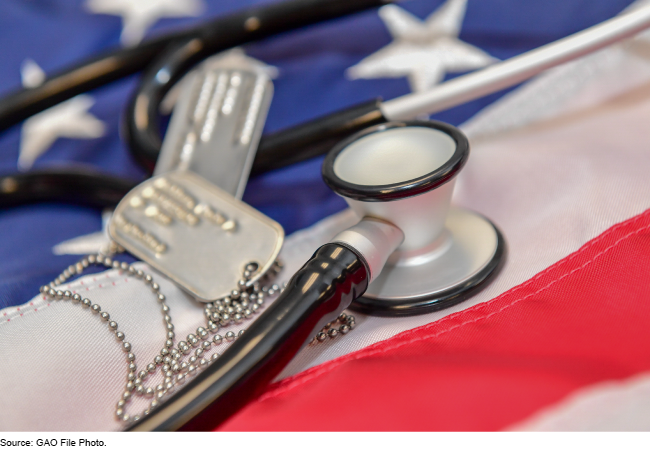Military Health Care: Preliminary Observations on DOD's Monitoring of Provider Qualifications and Competence
Fast Facts
After concerns about the quality of servicemembers' health care arose in 2014, Congress put the Defense Health Agency in charge of administering DOD's domestic medical facilities. We testified about how DHA monitors health care providers in the facilities.
Our preliminary observations from examining 4 medical facilities suggest that the facilities and DHA didn't always adhere to DHA's quality management procedures.
For example, facilities didn't verify all medical licenses before providers treated patients. Also, in most cases, they didn't review patient safety events—which harmed or could have harmed patients—in the required time frames.

Highlights
What GAO Found
The Defense Health Agency (DHA) must ensure the quality and safety of health care delivered by individual providers at its medical facilities. However, GAO's preliminary observations from its ongoing work indicate that four selected medical facilities and DHA did not always adhere to DHA's clinical quality management procedures for credentialing and privileging of providers, focused evaluations of providers, and reviews of patient safety events that could have caused or did cause harm to patients.
- Credentialing and privileging. GAO reviewed credentialing and privileging procedures for 100 selected providers from four selected medical facilities. For about one-sixth of providers, the facilities did not adhere to the DHA requirement to verify all medical licenses before granting privileges. For three-quarters of the providers GAO reviewed, the facilities did not adhere to the requirement to conduct ongoing performance monitoring every 6 months.
- Focused evaluations. GAO reviewed all 20 focused evaluations conducted by the four selected medical facilities during the period of GAO's analysis. Selected facilities did not document the metrics for evaluating concerns that arise about the quality and safety of an individual provider's care under a focused evaluation, as required, for about half of these evaluations. This raises questions about whether facilities ensured concerns were adequately addressed before returning providers to regular performance monitoring.
- Patient safety events. Selected medical facilities did not always adhere to procedures for reviewing patient safety events that may result in compensation to patients or their families. Specifically, for 19 cases from four facilities that had not resulted in compensation, the facilities never documented their consideration of whether such events warranted adverse action against a provider. Also, over four-fifths of selected facilities' reviews of these events exceeded required time frames.
GAO also found that DHA did not always adhere to its own requirements for reviewing the 12 patient safety events from four selected facilities that resulted in compensation to patients or their families. Specifically, about half of DHA's reviews of these events exceeded the required time frames and DHA did not report providers to a national database when those reviews exceeded the required time frames, as required.
In addition, GAO's ongoing work also indicates that DHA does not sufficiently monitor medical facilities' adherence to its clinical quality management procedures. As of March 2022, DHA's monitored credentialing and privileging by running reports on expired credentials, but did not monitor adherence to requirements not uploaded into DHA's database. DHA officials also told GAO they have not yet monitored facilities' documentation of focused evaluations, but are developing an approach to do so. Finally, DHA monitors medical facilities' reviews of patient safety events that have resulted in compensation, but DHA stated they are not yet monitoring the reviews of events that have not.
Why GAO Did This Study
Since 2014, Congress and the Department of Defense (DOD) have taken steps intended to strengthen patient safety in the Military Health System. As part of those efforts, Congress required DHA, an agency within DOD, to assume the military departments' administrative responsibilities for medical facilities, including ensuring individual providers are qualified and competent to deliver safe, high quality care to patients. This includes verifying providers' qualifications before hiring them, as well as reviewing any concerns that may arise about a provider as a result of routine performance monitoring or patient safety events.
This statement describes preliminary observations on selected medical facilities' adherence to DHA's clinical quality management procedures and DHA's efforts to monitor their implementation.
For the ongoing work on which this statement is based, GAO selected four medical facilities that varied by military department, geographical location, and number of patient safety events. Additionally, GAO reviewed relevant DHA procedures for clinical quality management and interviewed relevant officials from DHA and each of the military departments (Air Force, Army, and Navy) about these procedures and related monitoring efforts.
GAO plans to complete this work in summer 2022 and will make recommendations as appropriate.
For more information, contact Sharon Silas at (202) 512-7114 or silass@gao.gov.
